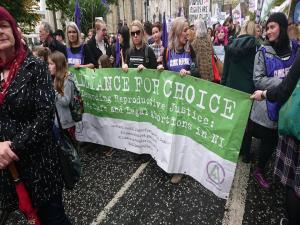
Q Radio News
Campaigners have lost a Supreme Court appeal over the legality of Northern Ireland's strict abortion law - despite a majority of justices declaring it is "incompatible" with human rights laws.
A majority of a seven-strong panel of justices in London ruled the Northern Ireland Human Rights Commission had no legal standing to bring its challenge against the abortion law.
But, by a majority ruling, the judges expressed the "clear opinion" that the current legislation is "incompatible" with European human rights laws in the cases of fatal foetal abnormality, rape and incest.
The justices said the Supreme Court "has no jurisdiction" in the proceedings to make a declaration of incompatibility or to strike down law.
During proceedings in October last year, the Northern Ireland Human Rights Commission (NIHRC) told the court the current law criminalises "exceptionally vulnerable" women and girls and subjects them to "inhuman and degrading" treatment.
A QC representing the commission argued that human rights were being breached, with those affected being forced to go through "physical and mental torture".
The court was asked to rule that a prohibition on abortions where a pregnancy arises from rape or incest, or "involves a serious foetal abnormality", is unlawful.
Submissions were also made at the Supreme Court by a number of bodies, including seven of the UK's leading reproductive rights organisations, Humanists UK, Bishops of the Roman Catholic Dioceses in Northern Ireland, the Society for the Protection of Unborn Children and Amnesty International.
Unlike other parts of the UK, the 1967 Abortion Act does not extend to Northern Ireland.
Abortion is illegal except where a woman's life is at risk or there is a permanent or serious danger to her mental or physical health.
Anyone who unlawfully carries out an abortion could be jailed for life.
The UK Government has resisted calls to step in and legislate amid the ongoing powersharing impasse in Northern Ireland, insisting that any decision on abortion in the region has to be taken by locally elected politicians at Stormont.


 Guidance sought over future of colourful parakeets in Belfast park
Guidance sought over future of colourful parakeets in Belfast park
 Woman released after questioning over pipe bombs in Co Down
Woman released after questioning over pipe bombs in Co Down
 Suspended chief constable will not be prosecuted over alleged sexual offences
Suspended chief constable will not be prosecuted over alleged sexual offences
 MI5 files not deliberately withheld from Stakeknife probe, review concludes
MI5 files not deliberately withheld from Stakeknife probe, review concludes
 Taoiseach urges gardai and others to testify at Omagh bomb inquiry if asked
Taoiseach urges gardai and others to testify at Omagh bomb inquiry if asked